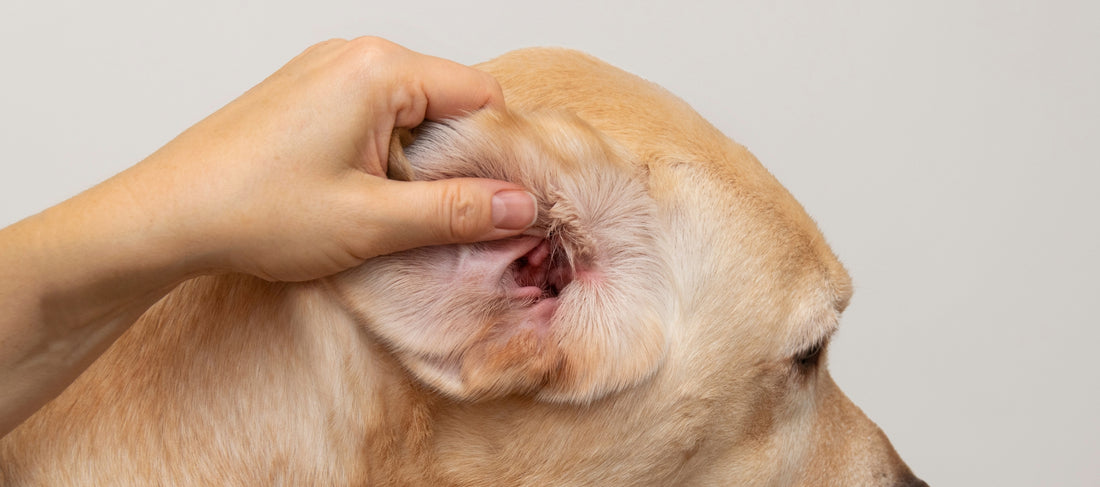Swollen ears are a relatively uncommon reason for dogs turning up at the vet’s clinic…but they certainly do happen! This article aims to provide an overview of the most common causes of a swollen ear in dogs. I also hope to give you - the concerned pet parent - an idea of what to expect from your visit to the vet with your puffy-eared pet.
Aural Haematoma
Aural haematoma causes the “flap” of your dog’s ear to become painful and balloon-like. The swelling occurs because a blood vessel inside the ear flap has burst, causing blood to leak out. This blood builds up within the flappy portion of your dog’s ear, causing it to become less flappy and more, well…swollen!
Aural haematomas occur due to trauma, such as a knock to the ear, or (most commonly) excessive head shaking. With shaking, an underlying ear infection or a small object such as a grass seed stuck in the ear is usually the root cause.
These ears are best treated surgically. Alternatively, your vet may try to drain the haematoma in the consult room using a needle, but these ears tend to fill back up with blood.
Ear Infection
Ear infections can cause your dog’s ear canal to become swollen, leading to a “closed up” appearance to the canal entrance. Other signs to be on the lookout for with ear infections include redness, soreness, and head shaking. Your pet’s hearing may also be affected.
Most ear infections can be treated medically without the need for surgical intervention. Typically, a combination of ear cleaning and medicated drops are used. Oral medications to provide relief from the pain and itching associated with an ear infection may also be prescribed to help keep your dog comfortable whilst they recover.
Soft Tissue Infections
A soft tissue infection may occur if your dog has been unlucky enough to sustain an injury to his or her ear, and this injury was not “clean”: for example, bite wounds from other dogs and cats, or the ear flap getting snagged on barbed wire (ouch!).
Swelling from a soft tissue infection develops a day or two after the injury. Pet owners may be surprised the morning after the event when the ear is three time it’s usual size!
Soft tissue infections need prompt veterinary attention. Antibiotics will be prescribed, along with pain relief. You’ll also be instructed to keep the area clean and dry whilst it heals.
Allergic Reactions
An allergic reaction - for example, to a bug bite or sting - can cause swelling just about anywhere on the body. The ears are no exception!
If your dog is experiencing sudden-onset swelling of any part of their face - including the ears - it’s best to see a vet without delay so that they can provide medication to halt further swelling and calm down the swelling that has already occurred. This is because swelling from an allergic reaction can spread relatively rapidly, and with facial swelling it’s possible for your pet’s breathing to become affected.
Cancer
Thankfully, cancer is one of the least likely causes of a swollen ear in dogs, but sadly it is possible. If your vet suspects that cancer could be the cause of your pet’s swollen ear, they will suggest taking a biopsy of the affected tissue. Along with other tests, this can help provide you with a diagnosis, based upon which your vet can advise you regarding the best course of action for your canine family member.
References
Bajwa, J. (2019) ‘Canine otitis externa - treatment and complications’, The Canadian Veterinary Journal, 60(1), pp. 97-99. Available at: https://www.ncbi.nlm.nih.gov/pmc/articles/PMC6294027/ (Accessed 1 December 2023).
Bellah, J.R. (2012) ‘Aural Neoplasia’ in Monnet, E. (ed). Small Animal Soft Tissue Surgery. John Wiley & Sons. Available at: https://onlinelibrary.wiley.com/doi/abs/10.1002/9781118997505.ch11 (Accessed 1 December 2023).
Hewitt, J. and Bajwa, J. (2020) ‘Aural hematoma and it’s treatment: a review’, The Canadian Veterinary Journal, 61(3), pp. 313-315. Available at: https://www.ncbi.nlm.nih.gov/pmc/articles/PMC7020633/ (Accessed 1 December 2023).
Shipstone, M. (2022) Antibacterials for Integumentary Disease in Animals. Available at: https://www.msdvetmanual.com/pharmacology/systemic-pharmacotherapeutics-of-the-integumentary-system/antibacterials-for-integumentary-disease-in-animals (Accessed 1 December2023).

